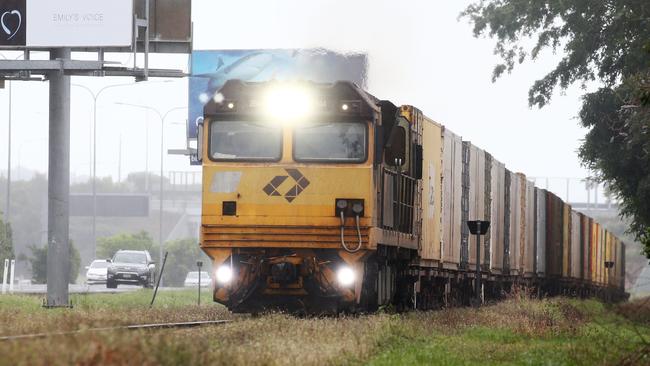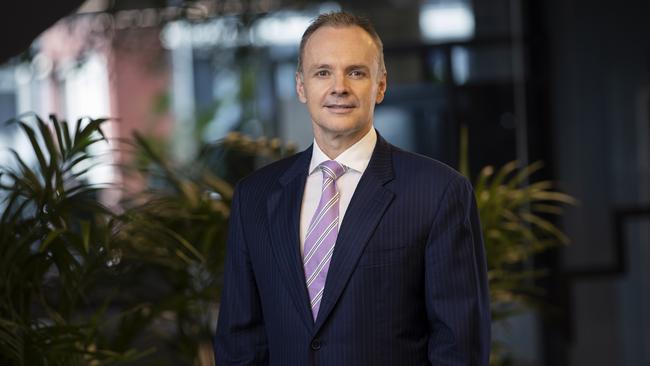Aurizon boss Andrew Harding lashes proposed safeguard mechanism changes
Aurizon boss Andrew Harding says proposed changes to the safeguard mechanism could lead to the ‘ridiculous and perverse’ outcome of driving up transport sector carbon emissions.

The federal government’s proposed changes to the safeguard mechanism could have the “perverse” effect of pushing more trucks onto roads and driving up carbon emissions in the transport sector, according to Aurizon boss Andrew Harding.
Speaking after Aurizon delivered its half-year financial results – which showed a halving of interim net profits to $130m, and led to a cut in annual profit guidance – Mr Harding said the proposed toughening of the safeguard mechanism would capture major rail haulers such as Aurizon and Pacific National.
But given it is only applied to major carbon emitters, it would not apply to the legions of small trucking companies – potentially pushing up rail freight costs and leading to more freight haulage on the roads, rather than rail.
A September 2022 submission from the Freight on Rail Group (FORG) – of which Aurizon is a member – noted the safeguard mechanism captured 65 per cent of rail transport’s scope 1 emissions, and only 2 per cent of freight carried by road.
The proposed revisions to the policy reset existing emission baseline values, and introduce a 4.9 per cent decline rate each year to 2030 to encourage big polluters to invest to reduce their operating carbon emissions – or buy offsetting carbon credits where they cannot.
But the FORG submission argues there is a lack of reliable alternative technologies to diesel freight trains, and electrification of freight lines would require heavy investment in infrastructure haulers rarely control.
To reduce transport sector emissions the government should instead encourage the shift of freight haulage to lower carbon intensity rail rather than penalise rail haulers – which have emissions on average 16 times lower than road for the same tonnage of freight moved, the submission said.

But Mr Harding said the draft of the safeguard mechanism rules released in January reflected none of the rail industry’s recommendations.
“As it’s currently proposed, it is bad policy. What it will do, if implemented in its current form, it will economically encourage people to shift freight from rail to road,” he said.
Mr Harding said Aurizon was not arguing that it should be exempted from meeting carbon reduction targets, but rail already released significantly lower emissions per tonne of freight moved than trucking.
The Aurizon boss said he was concerned that the “structural flaw” in the safeguard mechanism would drive more freight away from rail, and inevitably cause an increase in the transport sector’s overall emissions.
“I would say that is a ridiculous and perverse outcome,” he said. “We’ve got a policy that’s being sold on the back of getting greenhouse emissions down – but in the transport sector it will actually drive emissions up per tonne of products moved.”
He said Aurizon was preparing a new submission to the federal government’s consultation on the proposed new rules, which closes on February 24.
Aurizon shares took a battering on Monday after the company cut its earnings guidance on the back of lower volumes caused by bad weather, and a Queensland rail accident that caused a two-week disruption of haulage on its Blackwater line in Queensland – which carries about 20 per cent of Australia’s coal exports.
Aurizon cut its forecast for full-year earnings before interest taxation depreciation and amortisation (EBITDA) by 4 per cent to between $1.42bn and $1.47bn. Aurizon booked EBITDA of $673m for the first half of the year, down 7 per cent from the first half of last financial year, and net profit of $130m, down from $257m. It declared a 7c interim dividend, from 10.5c.
Mr Harding said that, weather effects aside, the company had seen solid growth across its non-coal bulk transport division in its OneRail division, and in WA.
He said the bulk division had failed to meet its growth target because of the failure of a single customer – which he declined to name – to begin shipping product in the half, as Aurizon had expected it to do.
Aurizon shares closed down 24c at $3.45 on Monday.




To join the conversation, please log in. Don't have an account? Register
Join the conversation, you are commenting as Logout